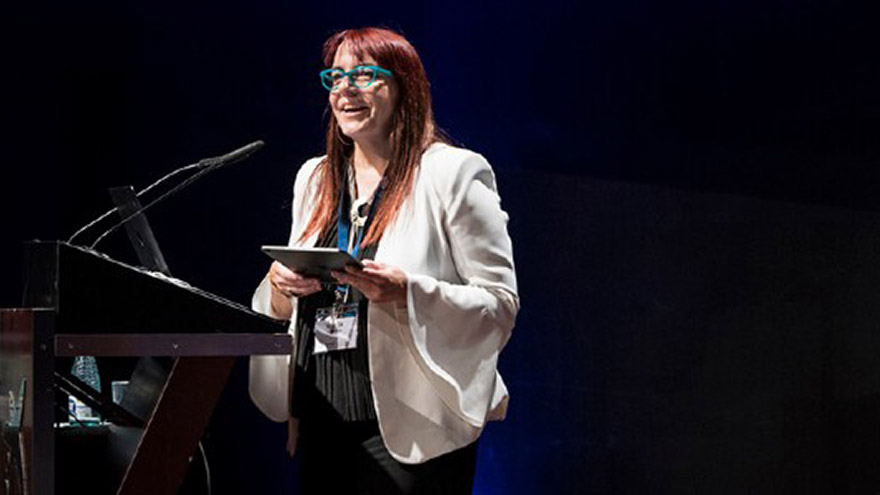"Society needs answers and expects science to provide them"
Marta Aymerich, UOC Vice President for Strategic Planning and Research

Marta Aymerich, UOC Vice President for Strategic Planning and Research
The current situation is testing not only individuals' resilience, but that of organizations and society in general, too. Now is the time to roll out initiatives for the common good, initiatives with high levels of added value for society. Marta Aymerich, UOC Vice President for Strategic Planning and Research, MD and PhD in Medicine from the Autonomous University of Barcelona and Master in Public Health from Harvard University, talks in this interview about how the University is adapting to the situation caused by the pandemic and stresses the vital role that knowledge and research are playing in understanding and facing up to this crisis.
The current situation is testing not only individuals' resilience, but that of organizations and society in general, too. Now is the time to roll out initiatives for the common good, initiatives with high levels of added value for society. Marta Aymerich, UOC Vice President for Strategic Planning and Research, MD and PhD in Medicine from the Autonomous University of Barcelona and Master in Public Health from Harvard University, talks in this interview about how the University is adapting to the situation caused by the pandemic and stresses the vital role that knowledge and research are playing in understanding and facing up to this crisis.
How would you rate the UOC's response to the COVID-19 outbreak?
The University has been able to organize itself right from the start and respond to the situation brought on by the pandemic. From day one, we've prioritized people's health and safety, while ensuring we kept operating. A crisis committee was set up with representatives from the highest levels. Initially it met every day and currently meets every other day. There's no doubt, though, that the UOC's e-working culture and the responsible attitude of our staff have been key. Straight away, we put together a specific section of the website to provide information on the pandemic and how the UOC was responding to it, and we put it front and centre on the home page.
What effects has the COVID-19 outbreak had on the University's activities?
We've had to make decisions regarding internships, assessment and other aspects of teaching that involved a lot of hard work and dedication from lots of people. This dedication can also be seen in the UOC's researchers who have submitted some fifteen projects to the urgent calls for research on SARS-CoV-2 and COVID-19. I'd also like to stress the efforts made by teaching staff to respond to all the media requests. They've spoken on a wide range of topics, from how best to handle being on lockdown to the economic effects the crisis will have on society. Likewise, we've developed a number of initiatives, in record time, to make the UOC's expertise in online learning available to the academic community. For example, we've produced a series of webinars as part of the Emergency Remote Teaching initiative.
One of the aspects that has stood out during this crisis is the role of universities and research, and one of people's first reactions has been to look to science. What role can the UOC play?
Society needs answers and expects science to provide them. But science may not have the answers or may not have the full answers yet because science makes progress by formulating hypotheses and refuting them, by evolving knowledge (what seems irrefutable today may well be refuted tomorrow). In this context, the UOC has the opportunity to act as a forum for surveying new intellectual ground, a forum for questions and reflections. It can act as a forum that is open to everyone, a forum promoting dialogue, and the creation and sharing of knowledge.
How can the UOC help fight the outbreak?
The UOC can contribute its specialized knowledge in the interactions between human activity and technology. Specifically, the UOC can: a) contribute to analysis of the situation produced by the crisis from different disciplines separately and together (interdisciplinarity), especially in terms of interaction between social sciences and technology; b) advocate for open knowledge and best practices for open access to research data and results; c) contribute knowledge on data science to study changing phenomena (such as crisis monitoring or aiding decision-making in general); d) contribute knowledge on digital health in the fields of artificial intelligence for medical imaging, the design and evaluation of health and telemedicine apps, or behavioural design (for individuals and groups), and e) contribute knowledge from its translational research in e-learning.
Hopefully the knowledge acquired in this pandemic and people's realization of the importance of science are here to stay.
What role will talent, innovation and adaptation to constant change now play?
This crisis means our planning processes have to take into account uncertainty, flexibility and the ability to adapt. Talent, global and multidisciplinary work, research, the innovation ecosystem and co-creation are key elements that we will need to build the proposals for the future of our university on.
Press contact
-
Editorial department
